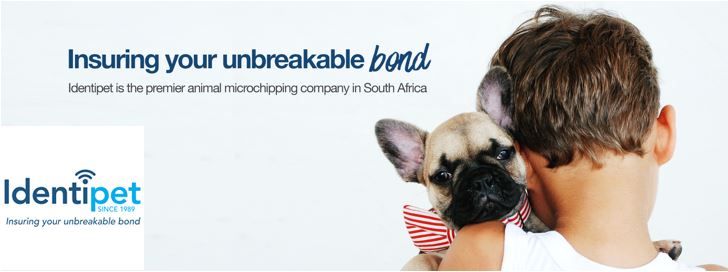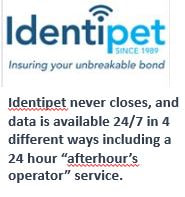Help – my dog has gone missing!
-
(preventative measures and what to do if this happens)
By Scotty Valadao – Accredited Animal Behaviourist (Canine) (ABC of SA™)
..
Your worst nightmare comes true, you arrive home from holiday only to discover that your beloved dog is missing. What do you do?
(In all the following, give out your contact information and if possible offer a reward)
PREVENTATIVE MEASURES
- One of the worst times of year for missing pets is the period between Christmas and New Year as well as Guy Fawkes, and Diwali. This appears to be due to the amount of animals that are fearful of the bangs and crackers and in desperation run, just to get away from the noise or are feeling insecure about being alone at home. Make arrangements that your pet is never left alone in the garden or house at this time - arrange for somebody to spend this time with your dog in your home or for your dog to stay with somebody. If your dog is outside, fit a Pet Door so that the dog can get into a sectioned off part of the home. As an additional preventitive measure, contact a behaviourist who can help your pet get over its fear of storns/noises. www.animal-behaviour.org.za. Arrange with your vet for medication to help your pet cope.
- All pets should be micro-chipped. This gives vets, shelters and similar organizations the opportunity of finding out immediately who the pet belongs to. This is a simple procedure and should be done as soon after getting your pet as possible. There is even a micro chipped ‘cat flap’ available now.
- Many people advocate that pets should wear collars giving your contact information. Due to the high instances of dogs that are strangled when their collars catch on the top of a gates and walls when trying to run away, not all owners are in favour of this method. There are special collars available that will snap if the pet gets caught on an object, but these are not fool (dog?)proof. Also, there is the possibility that the collar may come off, leaving the person who finds your pet with no contact information. If you’re pet is the type who goes ‘walkabout’ a micro-chip is a necessity, as well as contacting a behaviourist to learn how to stop or the ‘walkabouts’ and address why they are happening.
- If you have not booked your pet into a kennel or cattery for the holidays, have a responsible person staying in the house to look after your pets who will not be going out on Christmas and New Years Eve, in the event your dog stresses when there are fireworks around. Kennels and catteries fill up very quickly and it is important to make your booking well in advance. Always visit the kennel before booking to ascertain that it is up to your standards.
- Have a file available at home with all the contact information of the local vets and rescue shelters in it, as well as a recent photo of your pet, which can be used by the house sitter or a friend or family member to help
- search for your pet during your absence if it does stray - perhaps keep a copy of this with you as a safeguard.
- If you have good relations with your neighbours ask them to keep an eye out for your pet and if they see it in the street to follow your requests on what to do. Leave them with a picture and all contact information.
- If your have a contract with a security company, arrange with them that if the pet goes missing, you can send them all the information on your pet and ask them to look out for it and follow your instructions.
|
Simple measures such as the above can safe a huge amount of heartbreak and stress, and you will enjoy your holiday that much more knowing that you have done all you can to safeguard your pet. |

- Phone all the local vets and also surrounding areas - it has happened that somebody has picked up a dog and taken to their own vet which may be in a suburb close by.
- Contact all the SPCA’s and the Animal Anti-Cruelty Leagues, even those not directly in your area, stray pets are often taken to a shelter which is know to the person who helped. If possible, go and visit the rescue shelters. I have seen instances where owners have been told that their dog is not there, only to find the dog safe and sound at the shelter. This happens in the case whereby the owner may describe the dog as a Collie/Lab cross, and the shelters interpretation of what the dog looks like, is a bit different!
- Place a free advert n your local paper and a local daily publication. At the same time check the ‘found’ section daily in these publications.
- Many of the breeds, have their own rescue centres. If your breed falls into one of those categories contact them as well.
- Look up organizations which send e-mail featuring ‘lost dogs’ on the internet and Facebook such as Missing Pets. Just type in 'missing' on Facebook and you will find most of the pages. Check these a few times a day.
- Check with all the neighbours in your street and as many streets around you as possible.
- If none of the above lead to the recovery of your pet, you need to take your search further, as soon as possible.
- Put up posters of your vet at local vets, pet shops, supermarkets, on trees, billboards, robots, intersection, garages and at any parks near you or any open spaces where a dog could wander.
- Visit all the local animal shelters and look for yourself and leave them a picture of your pet. We do not always see animals in the same way and a wrong description could be given.
- Keep on checking the vets, shelters daily and visit as often as you can to look at any pets recently brought in.
- Keep your advert in the local papers.
PREVENTATIVE MEASURES
- One of the worst times of year for missing pets is the period between Christmas and New Year as well as Guy Fawkes, and Diwali. This appears to be due to the amount of animals that are fearful of the bangs and crackers and in desperation run, just to get away from the noise or are feeling insecure about being alone at home. Make arrangements that your pet is never left alone in the garden or house at this time - arrange for somebody to spend this time with your dog in your home or for your dog to stay with somebody. As an additional preventitive measure, contact a behaviourist who can help your pet get over its fear of storns/noises. www.animal-behaviour.org.za. Arrange with your vet for medication to help your pet cope.
- All pets should be micro-chipped. This gives vets, shelters and similar organizations the opportunity of finding out immediately who the pet belongs to. This is a simple procedure and should be done as soon after getting your pet as possible. There is even a micro chipped ‘cat flap’ available now.
- Many people advocate that pets should wear collars giving your contact information. Due to the high instances of dogs that are strangled when their collars catch on the top of a gates and walls when trying to run away, not all owners are in favour of this method. There are special collars available that will snap if the pet gets caught on an object, but these are not fool (dog?)proof. Also, there is the possibility that the collar may come off, leaving the person who finds your pet with no contact information. If you’re pet is the type who goes ‘walkabout’ a micro-chip is a necessity, as well as contacting a behaviourist to learn how to stop or the ‘walkabouts’ and address why they are happening.
- If you have not booked your pet into a kennel or cattery for the holidays, have a responsible person staying in the house to look after your pets who will not be going out on Christmas and New Years Eve, in the event your dog stresses when there are fireworks around. Kennels and catteries fill up very quickly and it is important to make your booking well in advance. Always visit the kennel before booking to ascertain that it is up to your standards.
- Have a file available at home with all the contact information of the local vets and rescue shelters in it, as well as a recent photo of your pet, which can be used by the house sitter or a friend or family member to help
- search for your pet during your absence if it does stray - perhaps keep a copy of this with you as a safeguard.
- If you have good relations with your neighbours ask them to keep an eye out for your pet and if they see it in the street to follow your requests on what to do. Leave them with a picture and all contact information.
- If your have a contract with a security company, arrange with them that if the pet goes missing, you can send them all the information on your pet and ask them to look out for it and follow your instructions.
- Let your local vet know that you will be going away and who is responsible for your pets while you are gone.
- Check your boundary walls or fence for holes and gaps and make sure that all gates open and close correctly.
Simple measures such as the above can safe a huge amount of heartbreak and stress, and you will enjoy your holiday that much more knowing that you have done all you can to safeguard your pet.






